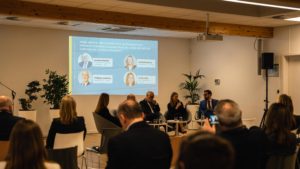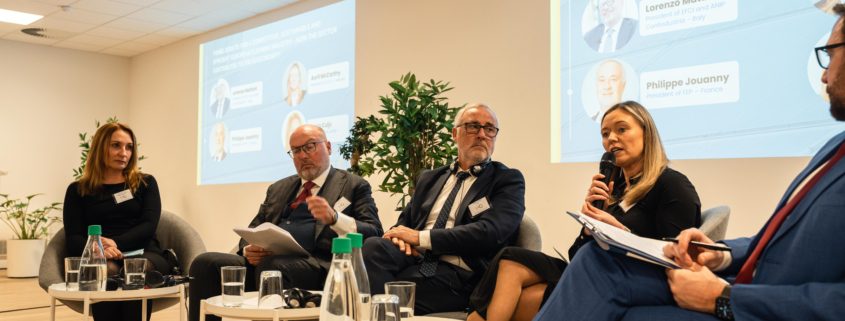Delving into EFCI’s priorities: a perspective from the EU cleaning industry
The second part of the event for the presentation of the Manifesto was centred around a panel discussion, animated by the external moderator Dave Keating, journalist and correspondent of France 24 in Brussels. The discussion represented the opportunity for representatives of EFCI members to share their perspective on how the priorities listed in the Manifesto apply and translate into their respective national experiences.
The panelists were Tanja Cuijc, CEO of the Cuijc cleaning company in Berlin and Board Member of BIV, the German association representing the cleaning industry; Philippe Jouanny, President of the French association FEP, Fédération des Entreprises de la Propreté FEP; Avril McCarthy, Chairwoman of the Irish Contract Cleaners Association ICCA and Lorenzo Mattioli, President of EFCI and ANIP – Confindustria.
To start with, Mr. Mattioli could explain more in detail the objective of actively working at EU level to ensure a joint representation of the labour-intensive services industry which, despite its relevance in terms of economic value, number of workers and value added, suffers from a gap in terms of visibility and recognition by politicians. “We need a direct interlocutor within the European Commission, someone who knows the reality and specificities of our sector and is able to better interact with our requests”, commented Mr. Mattioli. “In concrete terms, this is one of the main requests we address to the future policymakers in Brussels: just like other sectors, we expect that in the composition of the next EU Commission a Unit responsible for labour-intensive services be put in place”.
Ms. Cuijc expressed her views on the importance of preserving the autonomy and real independence of social partners, in a context where legislation is not creating unnecessary obstacles to the conduct of the business activities. “Social partners are best placed to understand what is happening on the field, taking the right decisions, and anticipating change, if necessary. It is essential that the legislator respects the spaces of freedom, autonomy and initiative of social partners, refraining from deciding on their behalf” explained Ms. Cuijc. “Business needs a stable and predictable regulatory environment, that guarantees the right time to adapt to the new provisions. Continuously setting new obligations for companies will not make it easier for them to comply”, concluded Ms. Cuijc.
Philippe Jouanny focused on the relevance of public procurement, bringing forward some concrete examples of the activities launched by the French association FEP in France to bring more clarity. “With public procurement representing up to 50% of the turnover in some EU countries, it is essential for our industry to make sure that its provisions are well-functioning, to guarantee the best level of quality in the service we provide and the working conditions we offer, but also the overall financial sustainability for cleaning companies” pointed out Jouanny. In the continuation of his intervention, he presented the case of the Index de la Propreté, a specific index elaborated by FEP to help companies and clients review correctly the prices in cleaning contracts, as a concrete example of one initiative that could become part of the new specific rules applying to public procurement at EU level.
In conclusion, Avril McCarthy presented her position on skills, pointing out the industry’s need to facilitate the process of skills’ acquisition and recognition. “Our workers need to know that whatever competence they have acquired – even in an informal way – working in our industry will be recognized by the system, and will be “expendable” in whatever other future career path. On the other side, employers need to be sure of the level of professional expertise acquired in any EU country by the individual worker, as a way to improve his/her employability and foster his/her freedom of movement” argued McCarthy. In this respect, the possibility of developing a framework for a common training certification for cleaning operations, recognized throughout Europe, was brought to the table.




